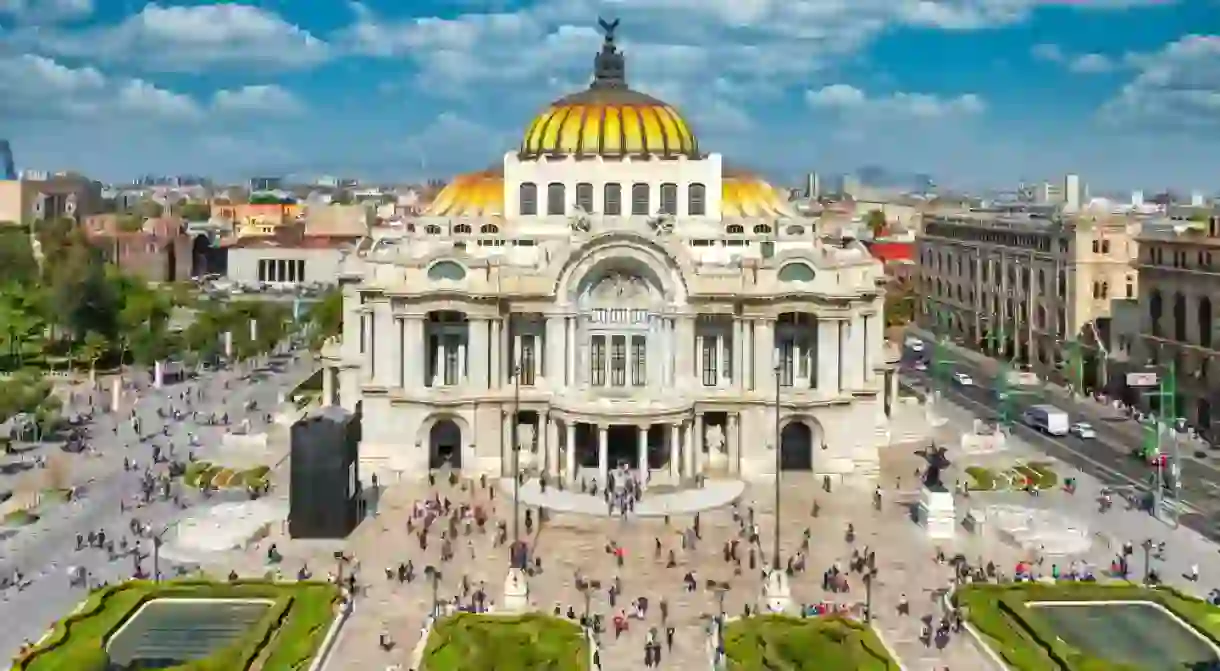A Tour Of Mexico City's 10 Most Famous Buildings

Teeming with famous buildings, Mexico City has an abundance of fascinating architecture, whether that be modern in design or ancient in inspiration. While there are too many intriguing offerings to see in one day, or even one lifetime, in this metropolitan capital, here are our top ten recommendations to start you off.
Catedral Metropolitana
Cathedral

The imposing Metropolitan Cathedral is easily one of Mexico’s and Latin America’s most iconic landmarks, given that it is the oldest and largest. Occupying a prime location looming over the capital’s zócaloit makes the perfect place to start this tour of Mexico City’s most famous buildings. Constructed using stone from ancient Aztec ruins, its design was inspired by Spanish Gothic architecture and the construction spanned almost three centuries.
La Casa de los Azulejos
Building
Although Bellas Artes trumps any building’s roof, the tiled external walls of Casa de los Azulejos – which literally translates to The House of Tiles – are a force to be reckoned with. White and blue toned tiles cover the length and breadth of the walls of this building and make it a truly spectacular Mexico City sight. Originating from Puebla state, the tiles were added to this 18th-century house after it was built. Casa de los Azulejos wins bonus points for having an early José Clemente Orozco mural in the interior.
Palacio Postal
Building, Post Office

Cross the zócalo and you’ll reach the epic Palacio Postal, also known as the Palacio de Correos. This grand post office is much more fascinating than it sounds; built early in the 20th century, the architecture is an amalgamation of many different and eclectic designs, and despite suffering damage in the 1985 earthquake, it has since been restored to its former glory. Designed by the same Italian architect who oversaw the Palacio de Bellas Artes, it’s a masterpiece of a building and easily one of Mexico’s most famous.
Castillo Chapultepec
Architectural Landmark
Perched high in the Bosque de Chapultepec, this magnificent castillo is an awesome example of 18th-century architecture and was once the home to Mexican Emperor Maximilian I and his wife, Empress Carlota. Now the home to the fantastic Museo Nacional de Historia, it sees thousands of visitors annually and is one of the most popular buildings in the city. Plus, it was used as a filming location for the 1996 Romeo + Juliet film starring Leonardo DiCaprio and Claire Danes.
Torre Latinoamericana
Building
Mexico City is one that deserves to be seen from above. Although it has many skyscrapers and outstanding buildings, what is arguably most impressive is its size. Sprawling lights as far as the eye can see slope up the sides of hills for miles around and drive home the vastness of this capital city. Which makes the view from the 41st floor bar, Miralto, such a special one. Once the tallest skyscraper in Mexico City, Torre Latinoamericana remains one of the most legendary and accessible.
Palacio de Bellas Artes
Building

Speaking of the Palacio de Bellas Artes, this instantly recognizable edifice is awe-inspiring. Gleaming white walls, pillars and sumptuous curves dominate the external façade, and the plethora of art that lies inside is equally as fascinating. However, the signature, standout feature of Bellas Artes is its shimmering orange and yellow hued roof which makes for a magnificent sight when viewed from above. Head to the top floor of the building opposite for the best view.
Palacio Nacional
Building
Running the length of the east side of the city’s zócalo, the Palacio Nacional is the focal point of the annual Independence Day celebrations, when the current president gives the grito (cry) of independence.If you enter through the central Baroque archway, you’ll find depictions of figures from Mexico’s Aztec heritage, such as Quetzalcoatl, within some of Diego Rivera’s famed murals. In addition, the palace also plays host to one of the largest libraries in the country; Biblioteca Miguel Lerdo de Tejada.
La Secretaria de Educación Pública
Building
This unassuming building is externally very forgettable, especially given its location in the heart of the architecturally fascinating historic quarter. However, this has made our list due to the abundant and beautiful Diego Rivera murals which adorn the internal walls. Free to see, there are over 200 on display and they are worth seeing whether you’re interested in Mexican art or not. What’s more, it’s a relatively unknown destination for many tourists, so offers respite from the bustling crowds elsewhere in Mexico City.
Museo Soumaya
Building, Museum

Built in 1994, this futuristic, glittering building with its sweeping upward curves is the brainchild of Mexican architect Fernando Romero. Named for the deceased wife of owner Carlos Slim, it is marvelous inside and out. It’s also home to some of the greatest pieces by the European Old Masters, as well as several thousand pieces by Mexican artists, ensuring the prowess of Museo Soumaya doesn’t lie solely in its architecture.
Iglesia de San Felipe de Jesus
Church
We round off our tour of Mexico City’s most famous buildings with another iconic religious edifice: the Iglesia de San Felipe de Jesus. This Catholic church is located on Calle Madero, a few steps from the central square. Constructed over a period of 13 years during the 19th century, it features a Neo-Romanesque exterior with many internal mosaics in a Neo-Byzantine style.













